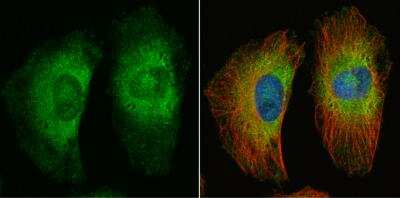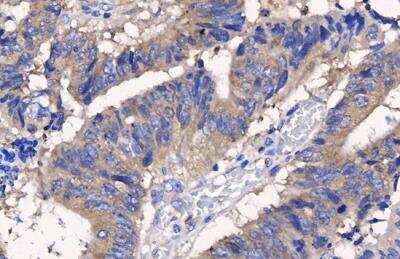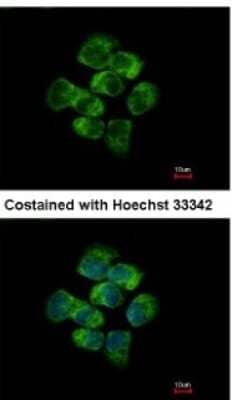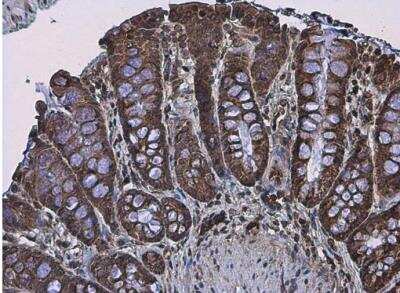APC Antibody
Novus Biologicals, part of Bio-Techne | Catalog # NBP2-15422

Key Product Details
Species Reactivity
Validated:
Human, Mouse, Rat
Cited:
Mouse
Applications
Validated:
Immunocytochemistry/ Immunofluorescence, Immunohistochemistry, Immunohistochemistry-Paraffin, Western Blot
Cited:
WB
Label
Unconjugated
Antibody Source
Polyclonal Rabbit IgG
Concentration
Concentrations vary lot to lot. See vial label for concentration. If unlisted please contact technical services.
Product Summary for APC Antibody
Immunogen
Carrier-protein conjugated synthetic peptide encompassing a sequence within the C-terminus region of human APC. The exact sequence is proprietary.
Reactivity Notes
Immunogen displays the following percentage of sequence identity for non-tested species: Porcine (88%), Bovine (88%).
Clonality
Polyclonal
Host
Rabbit
Isotype
IgG
Theoretical MW
312 kDa.
Disclaimer note: The observed molecular weight of the protein may vary from the listed predicted molecular weight due to post translational modifications, post translation cleavages, relative charges, and other experimental factors.
Disclaimer note: The observed molecular weight of the protein may vary from the listed predicted molecular weight due to post translational modifications, post translation cleavages, relative charges, and other experimental factors.
Scientific Data Images for APC Antibody
Western Blot: APC Antibody [NBP2-15422] - Various whole cell extracts (30 ug) were separated by 5% SDS-PAGE, and the membrane was blotted with APC antibody [C3], C-term diluted at 1:500. The HRP-conjugated anti-rabbit IgG antibody (NBP2-19301) was used to detect the primary antibody.
Immunocytochemistry/Immunofluorescence: APC Antibody [NBP2-15422] - HeLa cells were fixed in 4% paraformaldehyde at RT for 15 min. Green: APC protein stained by APC antibody [C3], C-term diluted at 1:1000. Red: alpha Tubulin, a cytoskeleton marker, stained by alpha Tubulin antibody NBP2-43837 diluted at 1:1000. Blue: Hoechst 33342 staining.
Immunohistochemistry-Paraffin: APC Antibody [NBP2-15422] - Human colon cancer. APC stained by APC antibody [C3], C-term diluted at 1:500.Antigen Retrieval: Citrate buffer, 20 min.
Applications for APC Antibody
Application
Recommended Usage
Immunocytochemistry/ Immunofluorescence
1:100-1:1000
Immunohistochemistry
1:100-1:1000
Immunohistochemistry-Paraffin
1:100-1:1000
Western Blot
1:500-1:3000
Please Note: Optimal dilutions of this antibody should be experimentally determined.
Formulation, Preparation, and Storage
Purification
Immunogen affinity purified
Formulation
PBS, 20% Glycerol
Preservative
0.025% Proclin 300
Concentration
Concentrations vary lot to lot. See vial label for concentration. If unlisted please contact technical services.
Shipping
The product is shipped with polar packs. Upon receipt, store it immediately at the temperature recommended below.
Stability & Storage
Aliquot and store at -20C or -80C. Avoid freeze-thaw cycles.
Background: APC
Long Name
Adenomatosis Polyposis Coli
Alternate Names
DP2, DP3, FPC, GS, Min
Gene Symbol
APC
UniProt
Additional APC Products
Product Documents for APC Antibody
Product Specific Notices for APC Antibody
This product is for research use only and is not approved for use in humans or in clinical diagnosis. Primary Antibodies are guaranteed for 1 year from date of receipt.
Loading...
Loading...
Loading...
Loading...
⚠ WARNING: This product can expose you to chemicals including mercury, which is known to the State of California to cause reproductive toxicity with developmental effects. For more information go to www.P65Warnings.ca.gov.




